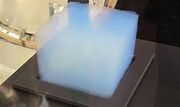Pyrogel
Description
Any synthetic, open-celled solid foam that is composed of a network of interconnected nanostructures. Aerogels are derived from gels in which the liquid has been replaced with gas while retaining the structure of the solid framework. The first document example of an aerogel was created the Samuel Kistler in 1931 with a silica gel (patented 1937). Kistler later made aerogels with alumina, chromia and tin dioxide., The unique properties of aerogels are due to its high surface area and open porous structure that provides extremely low density, thermal conductivity, and sound conductivity. Although they may feel fragile to the touch, they have strong structural integrity. They have been used in solar cells, fuel cells, batteries, supercapacitors as well as more mundane things, such as paints, cosmetics, coats, rugs, pipes, spill-clean-up kits and insulation. Of particular interest for museums is its usefulness in fire protection blankets (Praestegaard 2023).
Synonyms and Related Terms
Applications
- Fire protection
- Thermal and sound insulation
- Thickener
Risks
Physical and Chemical Properties
- Can withstand temperatures up to 1200C
- Very lightweight
Working Properties
- Cannot be fashioned into shaped covers inhouse; must be sewn to measurement by the factory
- Constructed 3-layer mat is very heavy, dense and hard to fold
Resources and Citations
- Praestegaard L., G. Sorig Thomsen, K. Woer 'Before the Fire: Experiments on Fire-Protecting Cover Materials', Studies in Conservation, Vol. 68 (1), pp. 1-8, 2023.
- Skanacid A/S: www.skanacid.dk
- Aerogel: What is Aeogel?
